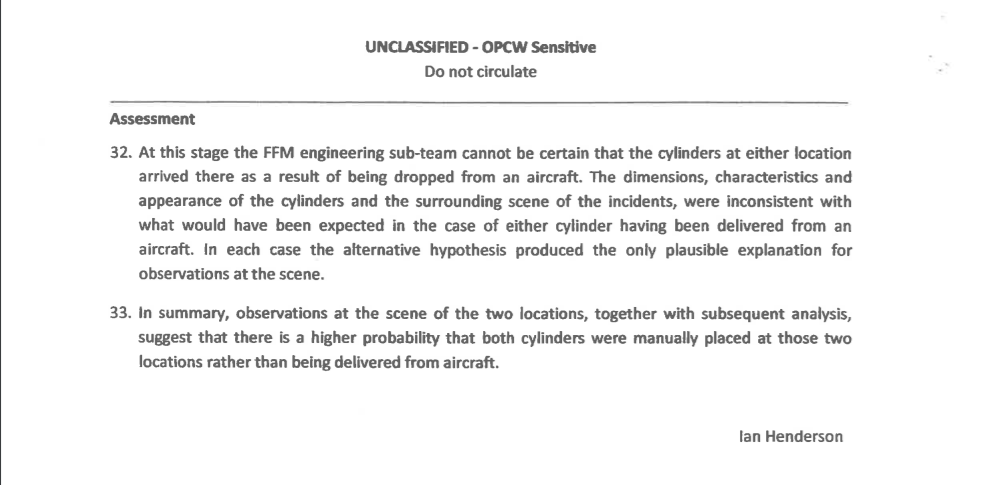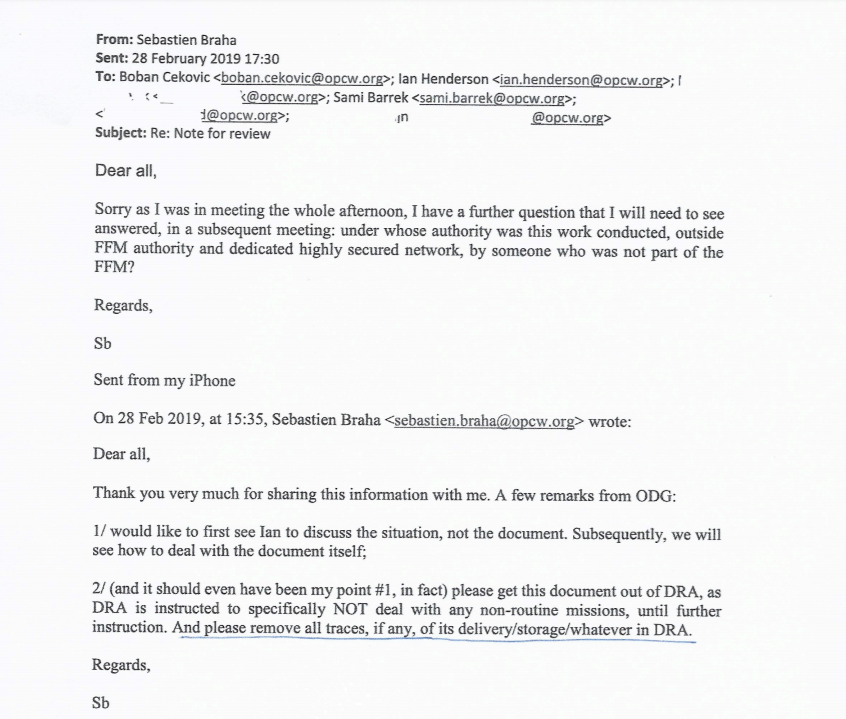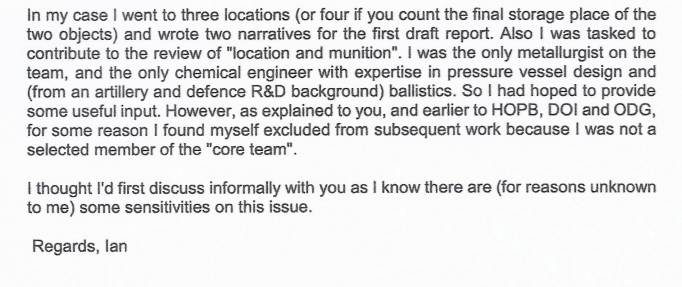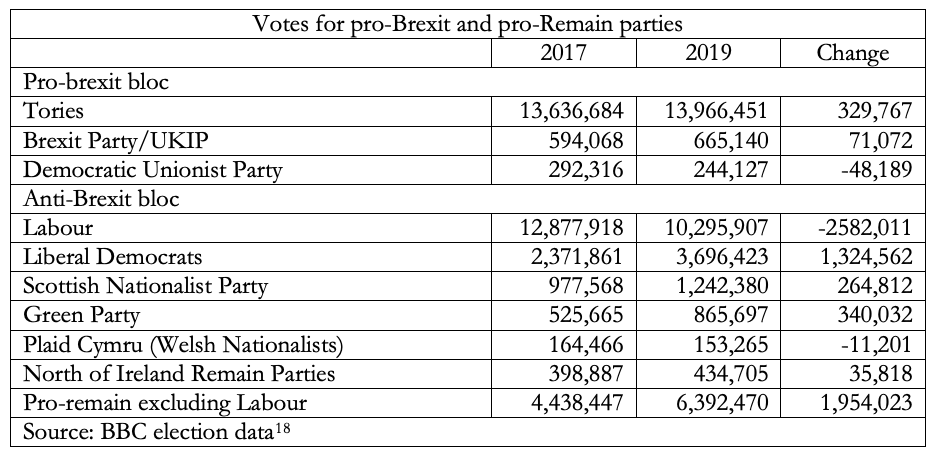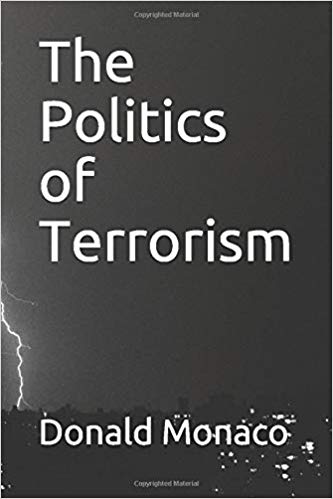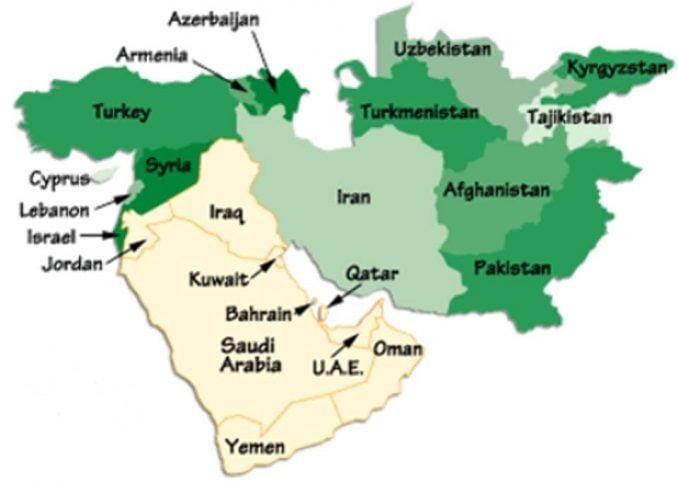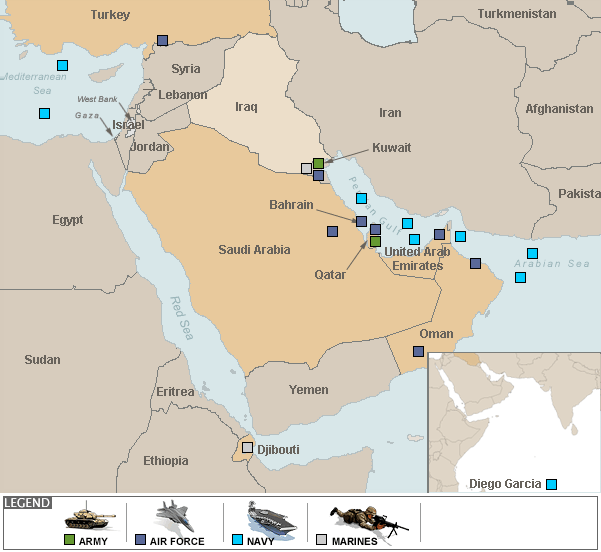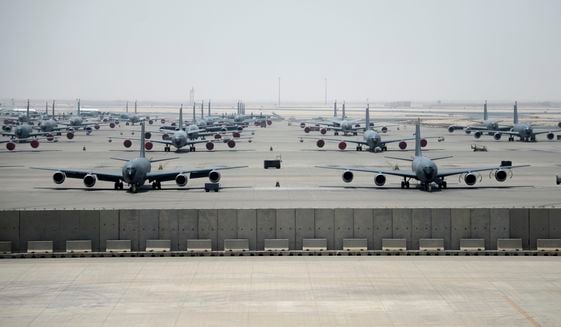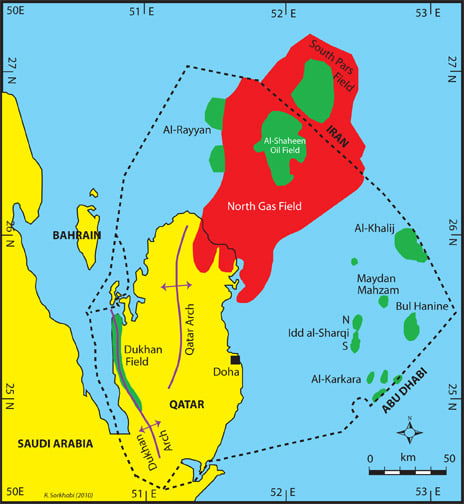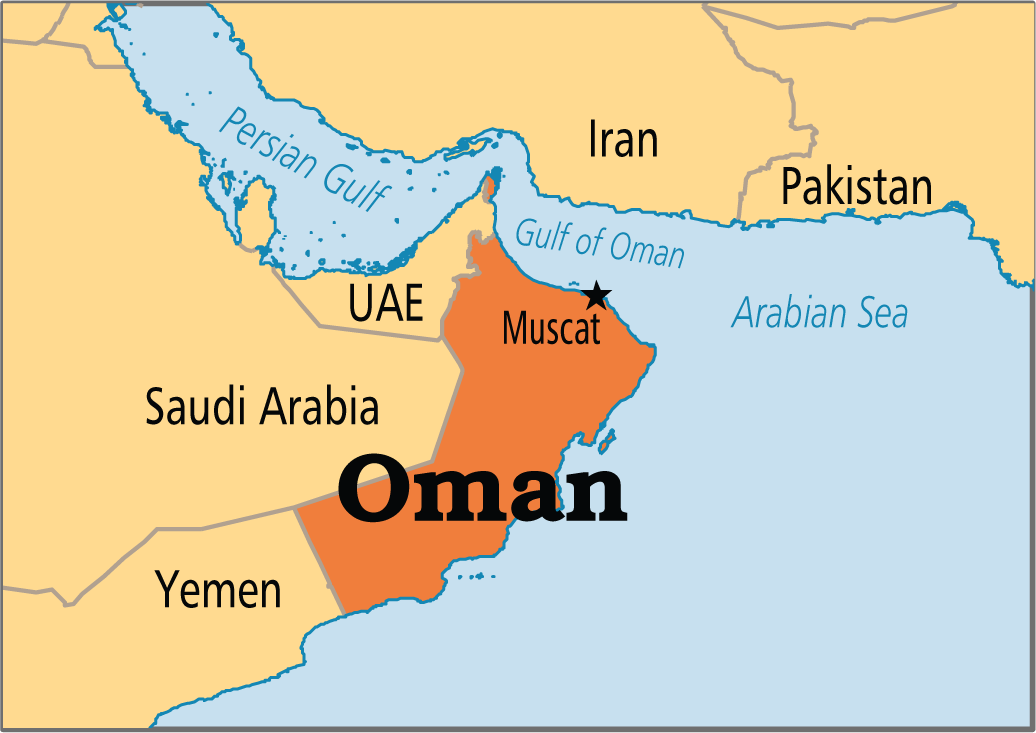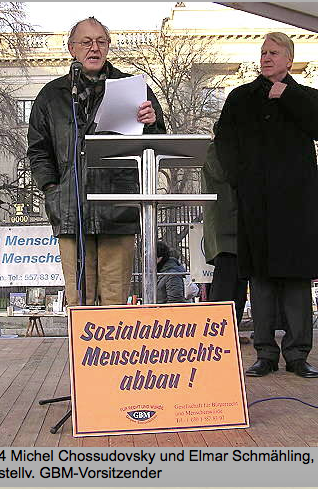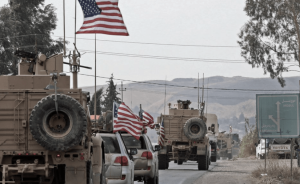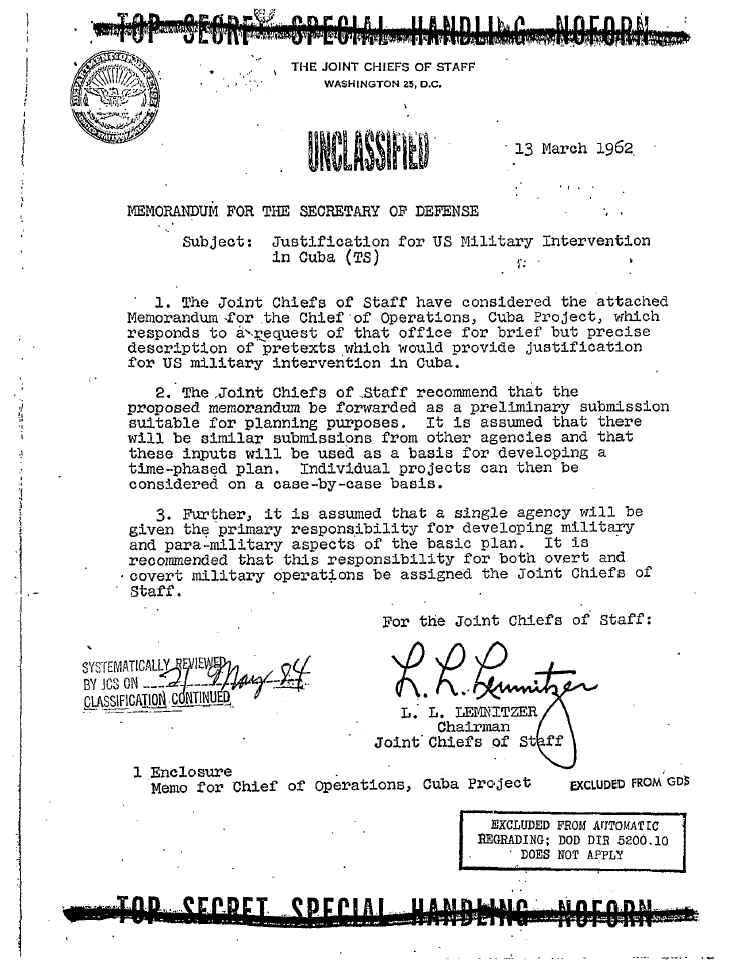The revolts that have swept over Iraq since 1 October 2019 come at a critical moment of increasing tensions between Iran and the United States, both allies of the Iraqi government.
Rivalry between the US and Iran increases
On August 29, 2019, the International Crisis Group published a report calling for the US-Iran conflict not to be settled in Iraq.
“In June, various rockets were fired at American installations in Iraq, and in July-August, explosions destroyed the storage sites for weapons and a convoy of Iraqi paramilitary groups associated with Iran. These incidents helped push US-Iranian tensions to the brink of confrontation and underlined the danger of the situation in Iraq and the Gulf.
Although the US and Iran have not so far collided directly with each other, they are forcing the Iraqi government to take sides. Iraqi leaders are working hard to maintain the country’s neutrality. But increasing external pressure and internal polarization threaten the survival of the government.
What needs to be done? The US and Iran must refrain from engaging Iraq in their rivalry, as this would undermine Iraq’s weak stability after the fight against ISIS. With the help of international actors, Iraq should maintain its diplomatic and domestic political efforts to remain neutral. ”
For geographical and historical reasons, Iraq is in the eye of the storm. Washington’s “maximum pressure” campaign on Iran and Tehran’s response put heavy pressure on the Iraqi government, a partner for both. The US expects Baghdad to resist Iran, and Iran expects Baghdad to resist the US. An almost impossible position.
Relations between the US and Iran have always had a dual character in Iraq. There has been cooperation between the two countries since the 2003 invasion to pacify Iraq, and at the same time, relations are very conflicting. The two countries are fighting each other for influence in the Middle East. The withdrawal of the Trump government in May 2018 from the nuclear deal and the reintroduction of US economic sanctions against Iran in November 2018 have created an explosive situation. Halfway through 2019, following Washington’s decision to tighten sanctions, a series of incidents opened the door to a new war that could engulf the entire Middle East.
Iran has used the power vacuum after 2003 to invest heavily in Iraq’s political system, economy and security system. Several Shiite militias and notorious death squads, allied to Iran, such as the Badr Brigades, were integrated into the brutal and sectarian National Police, created by the US. Together with the US, they fought the National resistance movement, while also resisting the presence of the US. The US and Iran also worked closely together during the four-year battle to defeat ISIS (2014-2017). Iranian-affiliated Iraqi Shiite militias formed the core of the Hashd al-Shaabi (popular mobilization forces – PMF), an amalgam of paramilitary forces that responded to Great Ayatollah Ali al-Sistani’s 2014 call to fight ISIS.
In the aftermath of the 2003 US invasion and the subsequent fight against ISIS, Baghdad has the largest US embassy in the Middle East and the largest number of US troops (more than 5,000) in six currently operating military bases:
- Forward Operating Base Abu Ghraib is one of the first military bases to be established in Iraq by the United States of America. The base is in Abu Ghraib, in the province of Anbar. It is just 32 km from the center of Baghdad and only 15 km from the international airport of the Iraqi capital.
- Justice Camp Base Base in Kadhimiya, Iraq. Camp Justice, formerly known as Camp Banzai.
- Forward Operating Base (FOB) Sykes is located in the northern Iraqi province of Nineve, a few miles outside of Tal Afar. The base was used as an established outpost for combat and tactical operations of the United States during Operation Iraqi Freedom.
- Camp Taji, Iraq – also known as Camp Cooke – is in the immediate vicinity, just 30 km from Baghdad. The base is used by coalition forces in Iraq and not just by the United States.
- Joint Base Balad was one of the many military installations that are maintained and used by the US in Iraq. It was known by multiple names, including Balad Air Base, Al Bakr Air Base, Camp Anaconda or LSA Anaconda. The base is one of the largest of the Americans.
- Victory Base Complex – also called VBC – is a combination of military installations around Baghdad International Airport. The complex includes 10 bases – Victory Fuel Point, Slayer, Striker, Cropper, Liberty, Radwaniyah Palace, Dublin, Sather Air Base, Logistics Base Seitz and Victory. The most important is Camp Victory. It houses the headquarters for all American operations in Iraq. The camp also includes the Al Faw Palace.
The end of US-Iran detente
The defeat of ISIS and the inauguration of President Donald Trump have put an end to the silent American-Iranian detente in Iraq and this has led to a period of escalating rivalry. In the aftermath of the Iraqi parliamentary elections of May 2018, that rivalry became very clear. Both Washington and Tehran tried to exert influence through their favorite actors. Their disputes over the formation of the government lasted thirteen months and yielded a list of acceptable, but weak figures, who, even within the political parties to which they belong, lack strong support. Prime Minister Adel Abdul-Mahdi and President Barham Salih, two somewhat isolated politicians, were appointed in October 2018.
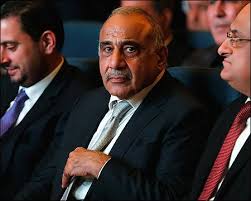
Adel Abdul-Mahdi (image on the right) is the personification of the bankrupt and corrupt political regime imposed by US imperialism. He started his career as a member of the Ba’ath party, then became a leading member of the Iraqi Communist Party and then went into exile in Iran as a loyalist to Ayatollah Khomeini. He returned to Iraq on the back of American tanks and joined the puppet government in 2004 as finance minister. He was described by the US Council on Foreign Relations as “a moderate technocrat who is helpful to American interests.” Like his predecessors since 2004, he helped organize the looting of Iraq’s oil wealth to enrich foreign companies, the local ruling oligarchy, and corrupt politicians and their supporters.
The function of the Minister of the Interior, Defense and Justice remained open for eight months, largely as a result of constant rivalry between Iran and the US. The tug-of-war between the two countries has been going on since 2003, because both the US and Iran must approve the composition of a government after every election. This shows that sovereignty for Iraq is still a distant dream.
US policy towards Iran has put strong pressure on the Abdul-Mahdi government. When Washington reactivated the sanctions against Iran in November 2018, the US called on the Iraqi government to stop payments to Tehran for natural gas and electricity and to diversify its energy imports, including through contracts with US companies. Baghdad asked Washington for more time to pursue alternatives for fear of reprisals from Iran and electricity shortages. Temporary respite from the Trump government allowed Baghdad to continue importing gas and electricity from Iran, but the US continued to urge Baghdad to sign energy infrastructure contracts with US companies.
However, Abdel Mahdi concluded a $ 284 million electricity deal with a German rather than an American company. The Iraqi prime minister refuses to abide by US sanctions and still buys electricity from Iran and allows extensive trade between the two countries. This trade produces large amounts of foreign currency that stimulates the Iranian economy. Abdel Mahdi is willing to buy the S-400 and other military hardware from Russia. He has signed an agreement with China to rebuild essential infrastructure in exchange for oil. And finally he tried to mediate between Iran and Saudi Arabia and showed his intention to distance himself from US policies in the Middle East. All these decisions made Abdul Mahdi extremely unpopular with the US.
Israel also interferes openly in Iraq. The country used its F-35i stealth fighter jets to attack Iranian targets in Iraq in July and August, seriously damaging four Iraqi bases used by Iranian troops and proxies as a supposed repository of Iranian ballistic missiles. The Iraqi government minimized this issue, first attempted to ignore it, and even attempted to let Israel off the hook. It took weeks before Abdul Mahdi announced in a television interview that there were “references” to Israel’s responsibility.
This reluctant position of the regime in Iraq is evidence of the loyalty to the US. There was not even a trace of indignation from the Iraqi government when Netanyahu bragged about bombing Iraq during his election campaign. The US denied any involvement in these attacks, but it is very doubtful that Israel would hit Iraqi targets without at least the consent of Washington. As a result, US military and coalition forces in Iraq must now request official approval before launching air operations, including in the campaign against ISIS.
Another requirement of the Trump administration is for the Iraqi government to dissolve the Iranian-related militias (PMF). Since the defeat of ISIS, these militias have taken control of various regions in Iraq and have also participated in the recent elections. No unit of the public militias was dissolved, on the contrary: In 2016, the government formally integrated the PMF into the security forces and has no effective control over their actions. The Fatah front, a collection of various militias from the PMF, became the second largest formation after the recent elections.
Endemic corruption
Despite the enormous oil wealth in Iraq, 32,9% or 13 million Iraqis live below the poverty line and youth unemployment is 40 percent according to recent figures from the IMF, while young people under 25 make up 60 percent of Iraq’s 40 million inhabitants. Half of all Iraqis are under the age of 18. The overall unemployment rate is estimated at around 23 percent, according to the Central Bureau of Statistics in Baghdad. The Iraqi organization “Al-Nama” estimates the percentage of unemployed women at more than 80%. Employment Rate in Iraq decreased to 28,20 percent in 2018 from 43,20 percent in 2016. Electricity is supplied for 5 to 8 hours a day, water is polluted, there is a failing medical system, education levels are very low, corruption is endemic. These are just a few of the problems that frustrate Iraqis. Politicians never keep their promises. Restoration and improvement projects are promised, but scrapped before the ink has dried up and the money being allocated disappears into corrupt pockets. The oil, which accounts for more than 90% of government revenues, is also the most important commodity on the black market. Criminal networks, including oil ministry staff, senior political and religious figures, are allegedly involved in corruption, in collaboration with Mafia networks and criminal gangs that smuggle oil and generate large profits. The three most disturbing problems for Iraqis are corruption (47%), unemployment (32%) and safety (21%).
Iraq is one of the most corrupt countries in the Arab world, according to Transparency International reports. The country occupies the 168th of the 180 countries in the corruption index. Deep-rooted corruption in Iraq is one of the factors that has been hampering reconstruction efforts for more than a decade. Former Prime Minister Nouri al-Maliki has “lost” $ 500 billion during his term of office (2006-2014), according to the Iraqi Integrity Committee (CPI). “Nearly half of the government’s revenues during the eight-year period were “stolen” or “disappeared”, said Adil Nouri, spokesperson for the CPl in October 2015. He called this “the biggest political corruption scandal in the history”. Iraq’s oil revenues amounted to 800 billion dollars between 2006 and 2014, and the Maliki government also received support of 250 billion dollars from various countries, including the US, during that period.
The World Bank ranks Iraq as one of the worst-governed states in the world, and the Iraqi government remains one of the most corrupt regimes in the world. The Iraqi government has so far made little effort to restoring the destroyed cities of its largely Sunni population after the fight against ISIS. It has done little to establish any form of ethnic or sectarian conciliation, and far too much of the ‘oil wealth’ is consumed by its politicians, officials and a government sector that is one of the best paid and least productive in developing countries.
Corruption, waste of government resources and the purchase of military equipment have increased Iraq’s budget deficit from $ 16.7 billion in 2013, $ 20 billion in 2016 to $ 23 billion for fiscal year 2019. MiddleEastMonitor quoted the head of the parliamentary finance committee Haitham Al-Jubouri on 18 December: “Iraq’s foreign debt amounted to more than $50 billion. More than $20 billion was paid back over the last period”. According to the official, Iraq still owes $27 billion to foreign countries, in addition to $41 billion to Saudi Arabia given as a grant to the late Iraqi President Saddam Hussein. Iraqi lawmaker Majida Al-Tamimi confirmed that Iraq borrowed $1.2 billion in 2005 and $1.4 billion in 2006 from the World Bank and external parties to support investment and bridge the budget deficit. Also the IMF came to the rescue with billion dollar loans that make the country even more dependent on the US and other foreign creditors. It’s not surprising that 78% of the Iraqi people consider the Iraqi economy as “bad” or “very bad”, according to IIACSS polling firm.
The constitution allows Iraqis to have two nationalities, but stipulates that the person appointed to a higher or security position must renounce the other nationality (Article 18, 4). However, no Iraqi official has complied with this Regulation.
Many senior Iraqi officials have dual nationality, including Prime Minister Adel Abdul Mahdi (France), former Prime Minister Haider al-Abadi and former Iraqi Foreign Minister Ibrahim al-Jaafari (UK) and Parliament President Saleem al-Jibouri (Qatar). Of the 66 Iraqi ambassadors, 32 have dual nationality, as well as an estimated 70 to 100 MPs.
Then there are the ministers in the current Iraqi government with a Western background: Mohamed Ali Al hakim – Minister of Foreign Affairs (UK and US), Fuad Hussein – Minister of Finance and Deputy Prime Minister (the Netherlands and France), Thamir Ghadhban – Minister of Oil and Deputy Prime Minister (UK).
Many officials accused of corruption by the Iraqi authorities have fled the country to escape persecution thanks to their foreign passport, including former ministers Abdul Falah al-Sudani (trade), Hazim Shaalan (national defense) and Ayham al-Samarrai (electricity).
Najah al-Shammari serves as the current defense minister from 2019 onwards in the government of Adel Abdul Mahdi. He is a Swedish citizen who is part of the Mahdi cabinet. The minister is under investigation for benefit fraud for claiming housing and child benefits from Sweden, according to the online news site Nyheter Idag and the Swedish newspaper Expressen. He is charged with “crimes against humanity” in Sweden.
President Barham Salih is a British citizen. A complaint was made against him by “Defending Christian Arabs”, who asked the Advocate General in Scotland to open an investigation against him for “crimes against humanity by giving permission or being complicit in the widespread attack on civilian demonstrations in Iraq that resulted in mass killings, injuries, illegal arrests and kidnapping of people. ”
Civil servants are known to demand bribes up to tens of thousands of dollars to give government contracts or even only to put a signature on a public document; also to arrange a lucrative function for a friend or family member. “Political parties are refusing to leave the cabinet because they will no longer be able to grab hold of the treasury”, a senior member of the ruling coalition told AFP.
Many appointments in the Cabinet, Directors General in Ministries and embassy staff are family members of Moqtada Sadr and Hadi Al-Ameri, the head of the Badr organization, the military wing of the Supreme Islamic Iraqi Council, the two largest parties in the Iraqi Parliament.
Amid the expected rescheduling of the cabinet, positions are already ‘bought’, according to a senior Iraqi official. “A political party is assigned a certain ministry and then sells that ministerial position to the highest bidder”. He described a transaction worth $ 20 million. It is a well-known script: the candidate pays the party for the position and then tries to appropriate as much public money as possible, with which the debt can be paid off. The system is so deeply rooted, observers say, that there is little that Abdel Mahdi can do to stop it.
Iraqi Prime Minister receives many visitors
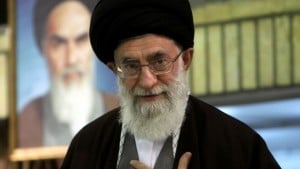
Donald Trump said in February 2019 that US soldiers must remain in Iraq “to guard Iran.” Two months later, on April 7, Iran’s chief, Ali Khamenei (image on the left), called on Iraqi leaders to ensure that the US military leaves “as quickly as possible.” Meanwhile, a procession of US and Iranian officials came to Iraq to defend their respective interests, including Trump himself during an unannounced visit in December 2018 and, four months later, Iran’s President Hassan Rouhani.
NATO Secretary General Jens Stoltenberg met with the Iraqi Prime Minister on 17 September to discuss a new military training mission to Iraq. Amid the current uprising, Russian Foreign Minister Sergey Lavrov also arrived in Baghdad on 8 October to discuss escalating tensions between the United States and Iran in the Gulf region.
Secretary of State Mike Pompeo warned Iran on December 13 for a “decisive” reaction if US interests are endangered in Iraq, following a series of rocket attacks on bases where US forces are housed. The military base at Baghdad International Airport became the target of two missiles on December 12. It was already the 10th attack on that basis since October. “We use this opportunity to remind Iran’s leaders that any attack by them or their proxies, which harm Americans, our allies or our interests, will be answered with a decisive response from the US,” Pompeo said in his statement.
The US military leadership has also made it clear that the death or injury of an American citizen is a red line that will lead to retaliation. “My fear is that the Iraqi government is not willing to take action, and if there is no willingness to stop this, then we will come to a point where we are pushed into a corner,” said a US military official. “We will not eat rockets all day and keep quietly watching when some of us are killed.” The US has sent between 5,000 and 7,000 extra troops to Iraq.
ISIS is no longer a big problem for Iraq
Iraq has changed so much because of the protest movement, that ISIS may no longer be an important challenge. The sectarian polarization from which ISIS benefited has faded. Moreover, now that many Sunnis have experienced a double trauma due to the draconian control of ISIS and the subsequent military campaign to recapture their territories, most of them no longer want to have anything to do with the terror group. The Iraqi security forces, in turn, have somewhat curtailed their sectarian excesses and forged a better relationship with the Sunnis.
Despite these reasons for optimism, securing peripheral areas where ISIS is still active remains necessary. But that is a task that should be entrusted to the Iraqi armed forces. The government still needs to rebuild the economies and public services of the areas devastated by the war against ISIS so that displaced persons can return. Healing the wounds of this conflict remains difficult. The judicial approach of the Iraqi government after ISIS threatens to deepen the contradictions in the country. “ISIS Families”: Citizens with alleged family ties to ISIS militants, who have been expelled from their homes, are in danger of becoming a permanently stigmatized underclass.
And as if there are not enough problems already, the Iraqi government must also provide an answer to reports that predict bleak economic prospects and a financial crisis in 2020. The military fight against ISIS was expensive and has exhausted the state treasury. The reconstruction of affected areas such as Nineve, Anbar and Salahaddin and the housing of hundreds of thousands of Iraqis who remain displaced by the fighting will be even more expensive.
The “lost youth” of Iraq take the future into their own hands
On October 1, young protesters appeared on Tahrir Square in Baghdad to express their dissatisfaction with the unlivable situation in their country. “No future”, “Iraq is done”, “Iraq is finished”, were often heard statements by young Iraqi people, who fled en masse from the country in search of a safe haven where they could build a meaningful future. According to a recent poll, the number of young people who absolutely wanted to leave the country had risen from 17% to 33% between 2012 and 2019. Since the withdrawal of US troops from Iraq in 2011, there have been continuous peaceful protests against what the Iraqi anti-occupation movement calls “the second face of the occupation”: the neoliberal economic structures and the sectarian corrupt political structures, a country which remained under control of imperialism. Those protest actions have had no effect so far. But that could soon change.
In the months prior to the October mass demonstrations, university graduates organized sit-ins at various ministries in Baghdad, often together with graduates from other cities. Security forces unleashed hot-water cannons on the sit-ins that were held from June to September.
Instead of giving in to the demands of the young people, the authorities launched a campaign to demolish homes and shops of unemployed and poor workers built on state-owned property in the southern cities of Iraq. Hundreds of thousands of people lost their homes, including some who had bought their land from militias or corrupt government officials. Most of them had used up all their savings, had incurred debts or relied on the help of their social network.
On 22 September, a small group of civilian activists in Iraq called to demonstrate on 1 October. They had no idea that their call would result in a general uprising.
The call, which insisted on the need to get out on the street against “the poorly functioning government”, was spread through various social media and was supported by the Al-Hikma Islamic Current, an Islamic Shiite political organization.
The established parties responded differently to the call. The Ba’athists announced that they could seize the opportunity to regain power. Muqtada al-Sadr noted that the end of the current government was near. The Workers Communist Party of Iraq (WCPI) warned the masses against participation in what they saw as protests organized by the Islamic parties. On the eve of October 1, there was a lot of confusion about who exactly was behind the call.
The protest would take place on Tuesday at 10 a.m. – a deliberate choice to distinguish the action from the Friday meetings organized by the Sadrists as well as to disrupt a working day (Friday is Iraq’s closing day). In the first hours of the demonstration on Tahrir Square in Baghdad, there were only a few hundred demonstrators. Most were supporters of the popular former commander of counterterrorism forces, General Abdul-Wahab al-Saadi, who were angry with the government’s decision to degrade him.
Soon other demonstrators filled the square. Around noon, the government started using violence against the protesters, first in the form of water cannons and tear gas, and later they used live ammunition. When at least 10 protesters were killed after the first day of protest, the uprising spread to all southern Shiite provinces, including the important oil port of Umm Qasr near Basra, reducing economic activity by more than 50 percent. Since the uprising in October, protesters have blocked access to oil fields in the southern cities of Basra, Nasiriyah and Missan and closed the main roads to ports to paralyze the oil trade. On November 2, the blockade of the Umm Qasr port, the most important access to Iraq, had already cost the government nearly $ 6 billion.
Iranian-sponsored Arab Shiite militias joined the government’s security forces and shot the protesters at random. Death squads faced unarmed demonstrators and every day protesters were shot. The government blacked out social media, shut down the internet, and announced a curfew in various cities. The demonstrators erected barricades and burned tires to prevent militia and government forces from entering their neighborhoods. The fight went on. An Iranian-sponsored militia, Asaib Ahl al-Haq, controlled the main access to Tahrir Square, the central square in Baghdad, and shot at demonstrators who were trying to reach the square. A new militia supported by Iran, Saraya al-Khorasani, attacked the al-Ghazaliya district in Baghdad, bombed a hospital and killed people in their homes.
On October 6, dozens of women and children were killed in Sadr City, the poorest district of Baghdad. Other cities also turned into a battlefield. Protesters set fire to the Islamic Shiite party offices in Nasiriyah and Missan and proclaimed Nasiriyah a city free of government parties. The deterrent effect of the government’s violent repression – along with its allegations of foreign influence – could not stop the protests, on the contrary, more and more people came to the streets. Protesters decided on October 25 to launch a new wave of demonstrations to honor the victims.
In Baghdad, the mobilization was initially motivated by socio-economic motives. The first demonstrators were unemployed youth from the Shiite east side of the city. Many have gone on a general strike to support the protesters and Iraqi unions are organizing events on Tahrir Square to support the protests. In southern Shiite Iraq, teachers’ unions have led a general strike movement in most schools and universities. Civil society students and organizations have also joined the second wave of protest that began on 25 October. Resistance to the political elite includes all social classes. It has become the largest grassroots movement in the modern history of Iraq. Millions of demonstrators take part in the daily actions and demonstrations.
On October 25, protesters and government forces faced each other on the Al-Jumhuriya bridge in Baghdad and two other bridges over the Tigris River that lead to the Green Zone. The demonstrators succeeded in occupying these strategic bridges, where government buildings, villas of top officials, embassies and offices of military mercenaries and other foreign agencies are located. Protesters attempting to move from Tahrir Square to the Green Zone were confronted with extreme violence: government forces used skull-piercing tear gas canisters, sound bombs and live ammunition. The Green Zone covers an area of 142 hectares and houses the US embassy of 750 million dollars, which was formally opened in January 2009 with a staff of over 16,000 people, mostly contractors, but including 2,000 diplomats.
The courage and creativity of the mass demonstrators are remarkable. Drivers of tuk-tuks – motorized three-wheeled rickshaws – have transported injured people from Tahrir Square to nearby hospitals. Civil society organizations, trade unions and political groups have set up tents on the square to provide logistical support, medical services, food and water supplies, helmet distribution, educational sessions and more. Doctors, nurses and medical students offer treatment to wounded and sick people on the square day and night. When protesters made a call to bring food to the square, families, restaurant owners, shopkeepers and others outside the camp flooded the protesters with food. The unemployed, the handicapped, members of Baghdad tribes and surrounding areas, academics, the Workers Communist Party of Iraq, the current Al-Sadr party, women’s organizations, opposition members of Parliament, the Iraqi Communist Party – all are involved in the mass demonstrations.
The majority of demonstrators grew up during the US invasion and occupation and the ongoing violence that followed. A banner from a young demonstrator reads: “We are a generation born in your wars, we spent our youth in your terrorism, our adolescence in your sectarianism and our youth in your corruption. We are the generation of stolen dreams and premature aging”. To the question: “How often have you felt so depressed in the past six months that nothing could encourage you?”, 43.7% of Iraqi respondents in the 2019 poll answered: “often” and 39.3% “sometimes” . This says something about the desperation of the Iraqi youth.
Absent in the current protests are the established political parties. These youth protests came as a surprise for them. The influence of well-known clergymen on the course of the protests, such as Great Ayatollah al Sistani and Moqtada al Sadr, has decreased considerably.
Moqtada al Sadr’s attempt to calm down the protesters by announcing that his followers would leave the parliament in solidarity with the protesters did not change the situation much. Protesters criticized the lack of solidarity by the two most important religious institutions in Iraq. They asked: “where is your duty to the Iraqi people, your dedication to piety and faith? Is the anthem played by a lady on the violin worse than killing hundreds of Iraqis?” They referred to an event a few months ago in which both Sunni and Shiite institutions protested against a woman playing the violin during the opening of a sports event in Najaf, because they felt that this was against the “true faith.”
Repression
The protest escalated within a few days with hundreds of deaths and thousands wounded. Party and government offices were set on fire in various cities.
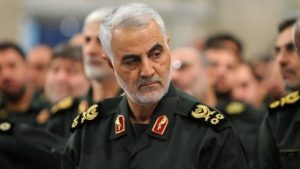
General Qasem Soleimani (image on the right), commander of the forces of the Iranian Revolutionary Guard and architect of the Iranian regional policy visited Baghdad several times since 1 October to discuss the strategy against the uprising with the Iraqi leaders, including Haidi Al Amiri, who heads one of the largest parliamentary blocs in Iraq and the Badr organization supported by Iran.
Most of the deaths are caused by machine gun fire and snipers, randomly in the crowd and on identified protest leaders. Amnesty International stated that security forces in Baghdad had deployed military-grade tear gas shells “to kill demonstrators instead of dispersing them.” These 40 mm shells are, according to Amnesty’s analysis, Serbian Sloboda Ĉaĉak M99 shells, but also M651- tear gas shells and M713 smoke shells produced by the Defense Industries Organization (DIO) of Iran Commissioner Yousra Rajab of the Iraqi parliamentary human rights commission said government forces used CF gas bombs containing poisons that cause blindness, miscarriages in pregnant women, strokes and burns that can lead to death.
The Iraqi army admitted on Monday 7 October that it had shot at demonstrators in Baghdad. “Excessive violence was used and we have begun to hold the commanding officers who have committed these crimes responsible,” the statement said. It was the first time since the outbreak of protests that security forces acknowledged that they had used excessive force.
The government sent the military anti-terrorism troops to Nasiriyah and the situation was initially resolved without further violence. But then came November 28. The security forces raided the demonstrators in Nasiriyah at night, killing at least 46 people and injuring many more.
An eyewitness: “They opened fire non-stop. They recaptured the bridge within five minutes … because they didn’t stop shooting, people ran away. I saw at least five people die before me. Everyone who was shot and killed was left on the street and the troops beat everyone they had captured. I saw them beating people as if they wanted to kill them. It was a catastrophe.
“We ran into houses to hide. The armed forces said through their loudspeakers: “If someone is hiding in a house, come outside or we will blow up the houses”. We had to come out. They were still shooting. They arrested and chased the remaining protesters to al-Habboobi square, the traditional place for the protests. But many residents of the city had gathered there to protect the protesters: men, women and children. The shooting went on until 7 a.m. ”
“The scenes from Nasiriyah this morning look more like a war zone than a city with streets and bridges. This brutal attack is only the last in a long series of fatal events in which Iraqi security forces have acted terribly violently against largely peaceful demonstrators,” said Lynn Maalouf, Middle East director at Amnesty International.
Security forces have launched a widespread campaign of night-time raids, arresting protesters. While some have vanished without a trace, others were subjected to torture and only released after being forced to sign pledges promising to stop participating in protests.
The security forces also resort to enforced disappearances as a way of creating an atmosphere of fear and paranoia among demonstrators. They have targeted medics, lawyers and journalists in particular. In addition, activists and journalists have received warnings that their names would be added to blacklists if they did not stop criticizing the authorities. Security forces have also infiltrated demonstrations, deliberately inciting violence and surveilling activists.
The authorities have systematically prevented information about human rights violations in the context of protests from getting out, including through sustained internet blackouts and the muzzling of government institutions. Paramilitary groups sent their militants to television channels that reported on the protests to destroy their equipment and studios. They attacked wounded protesters in hospitals and kidnapped and threatened journalists, doctors and everyone who supported the demonstrations. The Iraqi Communications and Media Commission issued warnings to five TV channels and decided to close nine others, as a direct result of their coverage of demonstrations. Despite constant reports of kidnappings, arrests and killings, definitive figures and exact information are not available.
Iraqi professor Kamel Abdul Rahim:
“I have never been convinced that Iranian General Qasim Soleimani played a major role in Iraqi politics, but the slaughter committed yesterday (November 28) in al-Nasiriya and Najaf (where at least 69 people were killed) ), a massacre that will no doubt spread to Tahrir Square in Baghdad, is a blatant expression of the way Soleimani views Iraq as an Iranian province. The Iranian ruling administration will never accept its loss in Iraq. They could possibly accept the loss of Yemen or Lebanon and even Syria … but Iraq is the red line.”
“Adel Abdul Mahdi, the generals and the other warlords, the entire political class … they all chose the deadly recipe of Soleimani. We are on the threshold of a bloody phase. The Trump government opted for silence and perhaps approved Soleimani’s plan. After all, there is a great consensus between the two “enemies” America and Iran. The theater for their conflict is Iraq ”.
“Iraqi citizens are the new threat to their common agenda because they oppose this imposed system. The Iraqi citizen has become a burden and the Iraqi people can only count on themselves to bring about change.”
Washington’s silence
Ironically, both Washington and Tehran oppose the protesters’ demand for the abolition of the regime. The position of the US is clear in support of the regime, as evidenced by the telephone conversation that US Foreign Minister Pompeo had with Iraqi Prime Minister Abdul Mahdi, on the sixth day of the protests, in which he spoke about “the power and depth of the strategic relations between the two countries”, while the blood of the killed protesters had not yet dried up.
The US Department of Foreign Affairs, which is largely concerned with securing the US bases, had initially not commented on the bloody repression of the demonstrators. However, at the end of October, after it was reported that Iran had concluded an agreement with the major Iraqi political parties to keep Mahdi in power and suppress the protests even harder, Washington began to talk about “respecting the demands of the protesters.”
The Atlantic Council, a pro-American think tank on international relations, explains precisely why the US remains so silent about the uprisings in Iraq: “Should the government decide to undertake real reform, it will need support from the international community. On this point, the United States needs to be careful. While calls from the US Embassy to avoid violence are certainly appropriate, it is important to remember that Iraqis are not just tired of Iranian meddling, but anyone’s. While the United States, so far, does not seem to be the focus of the protests, a recent Iraqi opinion poll showed a favorability rating for the United States at 22 percent, which at least was higher than the Iranians, who were at 16 percent. The poll also noted, however, that nearly 43 percent of Iraqis believe the United States influences Iraq in a significant way and that 53 percent believe the 2003 invasion’s purpose was to “occupy Iraq and plunder its wealth.” These numbers suggest that a strong, visible response from the United States could just make things worse.”
An Iraqi uprising initiated by the Shia population
Protests against the Shiite-led government originated in the central and southern provinces of Iraq, which have traditionally been the backbone of Iranian influence in the country. But this is not a Shiite uprising. This is an Iraqi uprising. The Sunni Arabs in Iraq tried to put an end to this system, but failed. Their protests in 2013 led to the emergence of ISIS and the destruction of their cities.
In the capital, sit-ins and strikes by students symbolizes the hope of a young generation that yearns for a non-sectarian policy. But in the south, where militia-backed militias are stronger than the state or the state itself, and where a party or militia can dominate the security apparatus, the anger of the people is even greater.
In Amara, for example, a crowd burned the headquarters of a powerful Iranian-backed militia. Guards opened fire, and during subsequent collisions, demonstrators pulled the wounded commander of the militia out of an ambulance and killed him.
Protesters stormed the Iranian consulate in Najaf, the seat of the powerful Shiite clergy of Iraq. They accused the Iraqi authorities of turning against their own people to defend Iran.
The Guardian reported on 29 November: “In the beginning, only a few dozen people protested,” says a 22-year-old demonstrator in al-Shatrah. “But when the locals heard the bullets and saw that their boys were killed, they left their homes. It became a matter of honor. We decided to free our cities from these parties.”
Many of the most powerful Iraqi politicians and militia commanders come from the south. The youth in the region formed the backbone of the Shiite militias who fought against the Islamic State (ISIS). Anger towards the militias and political parties began, activists say, with the defeat of ISIS, when young men returned from the front lines and discovered that their commanders had become warlords and had accumulated wealth and business contracts.
“So many politicians and officials come from this region, and yet this is a very poor province,” said Mohamed, a human rights activist and anti-corruption campaigner. “During the elections, politicians give people blankets and a few phone cards, give a few men a job with the police, repair a road … that’s how they win votes. After 16 years of Shiite rule, the children now say it was better under Saddam. ”
“Who are the Hashd al Shaabi? Our children were the Hashd. These politicians and commanders climbed on their backs to achieve their goal and gain power and wealth. ”
For Mohamed, “the status of the Shiite clergy has collapsed. If a militia commander now would come to the square, he would be beaten with shoes.” In the south, some of the most bloody incidents have occurred since the uprising began.
Iraq is governed by power sharing between religious and ethnic parties. Each party has their own militias, which are also internally divided and who want to obtain as much economic and political power as possible. Militia leaders who belong to these groups sit on administrative boards and control the ports, borders, oil fields, trade, etc.
The city of Basra is a good example, where the Shi’a Muslim Al-Dawa party controls the Al-Burjisiya oil field, the Sheeba and Al-Muthanna gas fields, the Basra International Airport and the Umm Qasr seaport. Another group, consisting of Asaib Ahl al-Haq and the Badr militia, controls the port of Abu Flous and the railway line. The Sadrist militia controls the stadium of the city and the Al-Shalamcheh border crossing with Iran. Al-Hikma, a Shiite Islamic block, guards the North Al-Rumaila oil field, the port of Al-Maqal and the border crossing with Safwan with Kuwait. Other areas such as the port of Khor Al-Zubair and the rectorate of Basra University are controlled by clans such as the Al-Battat.
Business contracts only go to people or companies that are affiliated with the ruling parties and their militias. Corruption is widespread, law enforcement is completely absent. Political parties and their militias flourish by using state revenues to enrich themselves, ranging from factories and agriculture to tourism, Islamic banking and private schools. Bribes for state contracts with foreign companies are channeled through the parties and militias that control the ministries.
In the predominantly northern Sunni areas of the province of Anbar and Mosul, which were bombed during the war against ISIS, people are not yet en masse on the streets. This is not because of a lack of support, but because of the repressive action against any sign of opposition. Even those in the region who have expressed their solidarity on Facebook are being arrested by security forces, while the authorities have made it clear that anyone who opposes the government will be treated as “terrorist” and ISIS sympathizer.
Regarding the position of the Kurds, the Kurdish leaders fear that they will be on the losing side if any change would occur in the current political system because an amendment to the Iraqi constitution would affect their guaranteed rights. They are therefore not opposed to the Iraqi government and Prime Minister Mahdi.
An uprising of the Iraqi youth
The current uprising was initially dominated by young people between the ages of 17 and 23. The younger generations no longer believe in political parties and the country’s leaders. At Tahrir Square in Baghdad, protesters have set up a “wall of wishes”, Reuters reported on 26 November. “I hated Iraq before October 25, now I am proud of it,” said 16-year-old Fatima Awad. “We used to have no future and no one would protest because everyone was scared. Now we are all gathered in Tahrir Square,” she added.
Unemployment is particularly high among graduates, the vast majority of whom are looking for work in the public sector because the private sector is so weak. Pathogenic factors associated with unemployment are increasing, including suicide, drug addiction and depression. Unemployment has boosted organized crime and has encouraged many young men to join militias.
In addition to the economic slump, the social fabric of Iraq has crumbled since the US-led invasion in 2003. The occupation exacerbated the destruction Iraq had already suffered as a result of the Gulf War of 1991, the bombing campaigns of the 1990s by the United States and the UK , and the murderous economic embargo since 1990. But despite this bleak reality, it is the youth of Iraq who are the driving force behind the ongoing protests.
The hope for a better future not only lives within Iraq, but also among the Iraqis in the diaspora. From Sydney to Toronto and also in Belgium, solidarity campaigns are being organized with the revolts. Sundus Abdul Hadi, an Iraqi-Canadian artist and author wrote in Medium.com on 1 November: “I would say that most of us in the diaspora have been completely seized or even obsessed with what is happening in our motherland. We are with heart and soul with the people in Iraq. Without social media I don’t know what I would do. It gives us the opportunity to make direct contact with people in Iraq, to share their vision and experiences. This I’d say that most of us in the diaspora have been completely absorbed, if not obsessed, with what is going on in our motherland. We are living it, body and soul, with the people in Iraq. If it wasn’t for social media, I don’t know what I’d do. It is giving us an opportunity to connect directly with people in Iraq, to share their vision and experiences. This is in complete contrast to the one-dimensional and one-sided images that came out of the Iraq war in 2003 from embedded journalists. (…) This revolution is also for those of us outside of Iraq, who are displaced or exiled, always longing to return, living in our nostalgias and traumas. It is for the Iraqis that have been robbed of a land to return to, of a homebound future to lay claim to. It is for the Iraqis, like me, who gave birth to children in faraway countries, whispering into their ears that they are Iraqi despite the fact that Iraq is an illusory, mythical place plagued by war and instability.”
At the front of the square, on the edge of the Jumhuriya Bridge, is the 14-storey “Turkish restaurant building” that overlooks Tahrir Square and the Jumhuriya Bridge (which leads to the Green Zone) and is the beating heart of the revolution. It has now been taken over by the young demonstrators who vowed not to leave the building. There are checkpoints at all entrances to the building and Tahrir Square where young volunteers check the possession of weapons that are prohibited at all times on the square. Each floor has a different function: one for the artists and the painters, one for the musicians, one for a library, one for security, etc. The building has been abandoned since 2003 after it was bombed in 2003 and never rebuilt. On all floors there are sleeping places, toilets are built and there is a cleaning service.
A demand for system change and restoration of national identity
Iraq suffers under the capitalist privatization process that pro-consul Bremer introduced after 2003 and was not abolished by successive Iraqi governments. The demonstrators demand – perhaps unknowingly – a return to the welfare state created by the Ba’ath regime, where the Iraqi population had a much higher standard of living than today. The polarization between the elite and the people is caused by the neoliberal economic policy (privatization, job crisis, etc.) and the militarization of the economy.
The most radical demand on Tahrir Square is the dismantling of this entire sectarian, political, Islamic system and an end to the country’s foreign control. This is the first and most important demand. The people want to change the constitution, expel the ruling political parties, abolish sectarian election rules, cancel all treaties with the World Bank. The people want to regain their sovereignty, expel the US army and its bases, expel the Iranian presence, expel the Turkish army, internationalize the issue of the Tigris and the Euphrates. The protesters want a separation of religion and politics. The young Iraqis use words such as citizenship, social justice, as opposed to the religious or ethnic identity that the influential clergy and rulers have imposed on the Iraqi people. The US occupation has done everything to erase the national Iraqi identity and to keep the country ethnically and religiously divided, which has given rise to bloody sectarian conflicts. But that tactic no longer works.
In a piece originally published in German by Rosa-Luxemburg-Foundation, Ansar Jasim and Schluwa Sama reported from Tahrir Square. “This is a movement of all of us, your origin does not play a role here, we are all suppressed by one political class,” an activist explains. Posters that prohibit any sectarian language are everywhere. Instead, people make references to elements that have played a unifying role in history, and Islamic and Christian symbols and drawings adorn Tahrir square.
Cuneiform script and figures from the Mesopotamian heritage of the region are also visible. Protesters do not have an exclusive Arab-Islamic identity as before, but want an identity that reflects the diversity of the country. Time and again they talk about all the different social, ethnic and religious groups that are present on the Square.
The demonstrations are supported by all religious and ethnic groups. The Mandaeans support the demands of the protesters and hand out food, the Chaldean Catholic church patriarch of Babylon Louis Raphael I Sako canceled a planned interview in Hungary and chose to “stay in Baghdad during this difficult time.” In a joint statement, Sako and other leaders of Christian communities thanked “the young men and women, the future of Iraq, for their peaceful protests and for breaking the country’s sectarian barriers and emphasizing the Iraqi national identity.”
Arabic next to Kurdish slogans are everywhere on the square. A Kurdish-Arabic tent invites demonstrators for free tea. There is also great solidarity from the Yezidi community, which sends money, but also brings food and water to the square. Even if they do not have a direct, visible presence on the square, they express their support for change that could lead to a renewed Iraqi identity.
But the religious leaders who run the country are not welcome in the square, with some even denouncing Moqtada al Sadr and others who are held co-responsible for the looting of the country. “Don’t ride the wave, Moqtada” is therefore a popular slogan, as well as “In the name of religion, politicians act like thieves!”
the resignation of Prime Minister Adil Abdul-Mahdi, an apparent concession to the demonstrators, has not paralyzed the movement. It was too little and too late, they claim. Their demand is an entirely new political system, not the removal of one person.
No to “Muhasasa”
The Iraqi constitution has caused anger among the Iraqi people since 2005 and has given rise to continuous protests. “No to Muhasasa, no to political sectarianism,” protesters in Tahrir Square sang after the resignation of Prime Minister Adel Abdul Mahdi at the end of November 2019. The divisive constitution has anchored “Muhasasa” in Iraqi society. Muhasasa is the system for distributing public offices, political positions and state resources along ethnic-sectarian lines between parties that are part of the ruling elite of the country.
One of the biggest ailments of the Muhasasa, according to Iraqi demonstrators and experts, is that it has driven the sectarian tensions and broke down the social fabric by putting ethnic-sectarian identities in the foreground.
Although the muhasasa was introduced by the United States after the 2003 invasion, the foundations of the system were laid in the early 1990s by Iraqi opposition groups, which worked out a system for proportionate representation of Sunni, Shiites, Kurds and other ethnic sectarian groups in Iraq.
Prof. Saad Naji Jawad has written extensively about the disastrous Iraqi Constitution. I draw from his analysis. When US pro-consul Paul Bremer arrived in Baghdad in May 2003, he had no prior knowledge of Iraqi politics, but immediately began issuing his 100 orders, many of which are still in force today. Bremer also formed a governing body, the Iraqi Governing Council (IGC), consisting of people selected on the basis of sect, ethnic background and, most importantly, their loyalty to the US. It was the first time in Iraq’s history that agreements were made on a sectarian and ethnic basis. 65% of the IGC members had dual nationality.
The IGC appointed a committee to review the draft for a new constitution. This draft was strongly influenced by American political interests and written by American advisers, in particular the Jewish professor Noah Feldman and Peter Galbraith, assisted by two emigrated Iraqis who had the American and British nationality and had not lived in Iraq since childhood. None of the authors was an expert in constitutional law. The document itself was written in English and was poorly translated into Arabic.
The committee lacked representatives of civil society organizations and the committee’s discussions were not made public. The committee appointed advisers, mostly foreigners, whose names were never disclosed. A few days after their appointment, two Sunni members of the editorial committee and an adviser who objected to the proposed draft were murdered. A few days later, another Sunni committee member was kidnapped and killed. The result was that the Sunni representatives stopped their participation and demanded an investigation into the murder of their colleagues.
The important items in the document were not even discussed. However, the Kurdish members had clear ideas about what they wanted and had a team of American and European experts who advised them.
The IGC was asked to approve the constitution and did so with only minor changes. The Council’s main objection was that the new law did not refer to Islam as the state’s official religion, and Article 7 was included at their insistence.
“Sect” is mentioned a number of times in the Constitution (for example, Articles 12 and 20). This divisive word was never included in earlier Iraqi constitutions and its use was rejected by a large number of Iraqis. The only Iraqis who agreed to use the term were those who participated in the political process.
Iraqis were not aware of the details of the document because no public version was available. Some Iraqi constitutional law experts and academics pointed out the dangers of divisive clauses, based on the very few press releases, but these critics were threatened by police and unknown militias.
The constitution stipulates that in the event of inconsistencies between central laws and laws of a regional government, priority is given to the laws of the local government. This is perhaps the only time in modern constitutional history that such a hierarchy has been established. Immediately after the adoption of the constitution, the Kurdish federal region issued its own local constitution, which contained many clauses that contradicted those of the central government, especially regarding the exploitation of national and regional wealth, such as the oil.
Iraqi women were dissatisfied with the Constitution because the 1959 Progressive Personal Status with all its advanced amendments was canceled (Article 41).
In October 2005, Iraqis voted on a permanent constitution that they had not seen, read, studied, discussed or drafted. Even worse is that they voted for an incomplete document. They followed the instructions of their political and religious leaders and the majority did not realize that this document would become a major source of misery.
The provision in the Constitution to keep the central government weaker than the regional authorities has caused a chronic problem for the state. The Iraqi political discourse has centered on ethnicity and religion instead of Iraqi citizenship. The various components within Iraq have great autonomy and pursue an independent foreign policy. For example, there is no objection to the declared alliance policy between the leaders of the Barzani tribes and Israel. An Iraqi politician, such as Al-Alusi, can visit occupied Palestine – at the invitation of the occupying government – and speak and openly call for an alliance with Israel. Al-Alusi was himself one of those responsible for the de-Ba’athification, a decision that blew up the Iraqi state.
No wonder that for the Iraqis this constitution remains controversial. The debate continues about the ambiguity of most articles. The constitution has undermined the unity and survival of the Iraqi state.
The role of the trade unions in the uprising
Trade unions are present in the protests, but not in the forefront. Months before the uprising broke out, public sector employees in Central and Southern Iraq, including textile workers in Diwaniyah, municipal workers in Muthanna and leather workers in Baghdad, formulated demands for better wages and safe working conditions, decent housing and permanent jobs. But these demands have faded into the background since the protests began.
At a meeting in Basra on October 28, trade unions of lawyers, teachers and employees formed a committee that urged other trade unions to support the demonstrator’s demands rather than their own sectoral demands. According to them, the role of the trade unions would be more effective if they would show their solidarity with the demonstrators instead of playing a leading role in the historical uprising.
Most, if not all, trade unions have issued press releases to support the protest movement. The General Federation of Iraqi Trade Unions (GFITU, the only official federation in present-day Iraq, dominated by the Sadrists) called for “solidarity” with the insurrection without asking the workers to participate in the demonstrations. The GFITU advised the demonstrators to “protect public property and maintain good contact with security forces”. The General Federation of Workers’ Unions in Iraq (GFWUI) condemned the government’s violent action and organized pickets outside oil companies and refineries in Basra, Nasiriyah, and Misan, and also held demonstrations in Baghdad and Babel. The GFWUI also set up tents in Nasiriyah and militants brought food and drink for the demonstrators.
In a mass meeting at the Basra Oil Company, the unions demanded an end to the repression. However, the local section promised to continue production and remove the demonstrators who blocked access. The most militant action is done by the unemployed and the poor workers, not by oilworkers, who are severely punished when they strike.
So far, the most precarious demonstrators have received the hardest blows. The poor, the unemployed, the people who have nothing to lose, are the ones who occupy the front lines and defy riot police, militias and even Iranian paramilitary forces. But to bring about real change, the organized working class will have to play a greater role in the movement if the Iraqi people want a state that actually defends their interests.
All social classes participate in demonstrations
On Tahrir Square, bakers, restaurateurs, doctors and nurses, hairdressers, etc., all offer their services free of charge. Families from all classes and neighborhoods are demonstrating together under the hashtag نازل_اخذ_حقي# (I am demonstrating to claim my rights). Hordes of students leave high schools and universities to participate in the protests. Trade unions have joined the uprising. According to a poll conducted last year, 77% of the Iraqi people supported the uprising of 2018 (in Iraqi Kurdistan it was 53%). The support for the current revolution will be probably higher.
But especially the Tuk Tuk drivers have become the symbol of the revolution par excellence. The Tuktuk is a three-wheeled vehicle that serves as a taxi for the poor, but is now a symbol of the revolution itself. Tuktuks are not only depicted on the walls around the square, songs are written about them and even the newspaper of the revolution, which reports on all activities in the square, is called Tuktuk. Tuktuk drivers were previously socially marginalized and discriminated against. They are mostly young, underage drivers who have no other choice than to do this job, given the high unemployment and widespread poverty.
Now they transport wounded demonstrators and also have a logistical function. They are the only vehicles that are allowed on Tahrir square. The increased social recognition is reflected in more and more donations from other protesters, mainly from other social classes. This is necessary, because these young drivers often offer their services free of charge.
Another group on which the Iraqis have changed their opinion since 1 October are the residents of the southern province of Dhi Qar. Some of the most aggressive protests have taken place here, where protesters have set fire to political party offices and have gained a degree of control over the provincial capital Nasiriyah. In the meantime, the demonstrators of Dhi Qar have gained heroic status among their countrymen. This is despite the fact that the inhabitants of the city have had a bad reputation for decades. They are often described as “bad” fruits that have fallen from the “cursed tree.” If someone did something bad somewhere, it was often said that the person “probably comes from Nasiriyah”.
Since the demonstrations started, the people of Nasiriyah were praised for their courage. “We, the Baghdad demonstrators, have been trying to cross the bridge to the Green Zone for weeks,” is a slogan in Tahrir Square. “We are now asking our fellow demonstrators in Nasiriyah to help us do that faster.”
Women are prominently present in the revolution
Women have long been marginalized and silenced by conservative Islamists and now they have decided to finally make themselves heard. They joined the protest movement en masse. In a society where sexes do not normally mix, protesting alongside men means that a taboo has been broken. This is also a revolution against outdated traditions and norms. Men and women walk hand in hand, hug each other and people even kiss. This is unseen. There is no doubt that the uprising is a turning point for women, but the road to their freedom and rights is still full of obstacles. Breaking the artificial barrier between men and women is one of the most beautiful and significant outcomes of this historic uprising. The women come from all sectors of society, with or without headscarves, Muslims, Christians, young people, the elderly, middle-class and working-class women, housewives … they all participate, in the front lines or as logistical supporters. This is a hopeful evolution and no power will be able to reverse it, despite all the efforts and money that political Islam has spent to impose its feudal culture.
The women who demonstrate, offer help and even spend the night on Tahrir Square also feel completely safe. The office of the Iraqi Human Rights Commissioner stated on November 6 that “since the beginning of demonstrations in the various Iraqi provinces, there has been no case of women being harassed despite the participation of thousands of women”.
Iran, the big enemy?
Although Iran itself is threatened by the US and Israel and suffers from a criminal sanctions regime, the country has worked with the US since 2003 to pacify the country and shape the sectarian system. Iranian and American ambassadors have very actively tried to stop any Iraqi attempt at independence. Both the US and Iran must approve the composition of a government after each election in the secure Green Zone. At the same time, the relationships are very conflicting. Both Washington and Tehran fight each other for complete control of Iraq.
It has also become clear that the American mission in Iraq, set up to create a pro-American model for the region and a stronghold against anti-American militantism, has achieved the exact opposite. The defeat of Iraq was intended to illustrate how much the US firepower could intimidate the region and scare off the so-called “rogue states”. Instead, the policy outlined by the neoconservatives, Israel and the oil companies has ironically strengthened Iran’s power, the only regional power to withstand all that pressure, and is now the new “rogue state.” Iran’s regional status has risen in a way that was impossible without this background of failed imperial politics. Mohammad Ali Abtahi, the Iranian Deputy Chairman for Legal and Parliamentary Affairs – at the Conference The Gulf and Future Challenges, held in Abu Dhabi, January 2004 by the Emirate Center for Strategic Research and Studies – clearly explained Iran’s role in the occupation of Iraq. “The fall of Kabul and Baghdad would not have been easy without the assistance of Iran,” Abtahi said about the role of Iranian militias and intelligence in Iraq and Afghanistan. The Iranian threat is now imminent and pro-American authoritarian regimes in Egypt, Saudi Arabia and Jordan have helped to achieve this.
At the beginning of March 2015, several Arab newspapers reported that Ali Younesi, a senior adviser to Iranian President Hassan Rouhani, had declared that Baghdad is the capital of “a new Persian Empire”. “Iran has today become an empire as it has been throughout history and the capital is now Baghdad in Iraq, which reflects the center of our civilization and our culture and identity today, as it was in the past”.
The “ISNA” news agency reported on his intervention in a forum in Tehran entitled “The Iranian Identity”. Younesi said that “Iran and Iraq are geographically indivisible. Younesi, who was the minister of information in President Mohammad Khatami’s ‘reform’ government, denounced anyone opposed to Iranian influence in the Middle East :”We will defend all peoples of the region because we consider them to be part of Iran. We will fight Islamic extremism, fight Takfiri, atheists, neo-Ottomans, Wahhabists, the West and Zionism.”
He emphasized the continuation of Tehran’s support for the Iraqi government and sent a clear message to Turkey: “Our competitors, the historical heirs of the Eastern Roman Empire, the Ottomans, resent our support for Iraq.” Younesi also stated in his speech that his country is planning to establish an “Iranian Federation” in the region: “by Iranian Federation, we do not mean to remove borders but that all nations neighboring the Iranian plateau should be close. I do not mean that we want to conquer the world all over again, but that we must regain our historical position to globally think and act Iranian”
To understand the ambiguous position of Iran, we must go back to the Islamic revolution in Iran in 1978-79, initially welcomed by the Iraqi government, because for the two countries the Shah was a common enemy. Ayatollah Ruhollah Khomeini, however, saw Saddam Hussein’s secular, Arab-nationalist Ba’ath regime as un-Islamic and “an envoy of Satan”. The call by Khomeini in June 1979 to the Iraqi Shiites to overthrow the Ba’ath regime was therefore badly received in Baghdad. In 1979-1980 there were anti-Ba’ath riots in the Shiite areas of Iraq, and the Iranian government provided extensive support to the Iraqi Shiite militants to unleash an Islamic revolution. The repeated calls for the overthrow of the Ba’ath regime and support for Iraqi Shiite groups by the new regime in Iran was increasingly seen as an existential threat in Baghdad. Iranian pan-Islamism and revolutionary Shia Islamism, against secular Iraqi Arab nationalism were therefore central to the conflict between the two countries. Many of the current rulers in Iraq, including former Prime Minister al-Maliki, returned from Iran to Iraq on the back of the American tanks. Revanchist motifs played a major role. Officers from the former Iraqi army were systematically killed on the basis of death lists. Militias like the BADR Brigades, supported by Iran, sometimes worked together with the US to combat armed resistance, in a particularly brutal way. At other times they turned against the US. The US had no choice but to accept this option so as not to sink further into the Iraqi quagmire.
The Iranian discourse reflects ignorance about the reality of the Arab national identity. It is more important to the Iraqi Shiites than their religious identity. For example, in 1980 Khomeini wrongly thought that the Shiites in the Iraqi army would not fight against Iran and that they would choose Iran’s side because of their religious affiliation. But that didn’t happen. Iran does not seem to realize that the socio-religious rules in Iran are incompatible with the less strict religious behavior of Arab Shiites. This is an element of alienation for Shiite Arabs. The various Iranian statements have also angered the Shiites. 24 “battalions” consisting of 7,500 special police units accompanied more than 3 million Iranians arriving in Karbala province in Iraq to participate in the Arbaeen pilgrimage. Most Iraqi Shiites didn’t like that either..
But the Saudi alternative cannot appeal to the Iraqi Shiites either. The expression of Arab identity or Iraqi identity is the opposite of the reactionary definition of Saudi Wahhabism.
The inhabitants of the Shiite provinces also suffered little from the Anglo/American military campaign that befell the Sunni provinces. No Shiite city has undergone the destruction of Falluja, Ramadi, Mosul, Tikrit and other cities.
Ayatollah Khamenei, Iran’s supreme leader, stated in October 2019 that the uprisings and demonstrations in Iraq and Lebanon were fueled by foreign powers, a vision also adopted by the Iraqi government and Hezbollah in Lebanon. Khamenei described the demonstrations in a tweet as “a conspiracy that will have no effect!” According to him, this “conspiracy” was led by the United States, Israel, Saudi Arabia, and remnants of the Ba’ath party, to overthrow the government and install a regime under Washington control. Even the highest Shiite religious authority, Grand Ayatollah Ali al-Sistani, indicated a possible plot in a statement, although he also condemned the violence against the demonstrators.
For months there had been rumors of a US-initiated coup in Iraq. More than two months before the uprising, Qays Khaz’ali, leader of Asaib Ahl al-Haq (AAH), an Iranian-sponsored Shiite militia and political party operating in Iraq, said: “There are plans to change the Baghdad government in November, with protests that will break out in October. Protests will not be spontaneous, but organized by factions in Iraq. Pay attention to my words ”
Sharmine Narwani on October 5, 2019: “Al Akhbar newspaper says the Iraqi government heard 3 months ago about of a planned US-backed coup by military officers, followed by street action. Time to be skeptical about events in Iraq? ”
“Protesters confirm the use of snipers in buildings aimed at demonstrators approaching Tahrir Square. During the US coup in Ukraine in 2014, the same method was used to bring about regime change.” So it was insinuated that the snipers shooting at the demonstrators were allied to the US, while the Iraqi army leadership itself admitted that its armed forces are responsible for the death of the demonstrators.
The claim that some Iraqi officers planned a coup has not been proven. Similarly, there are claims that Iran is planning a takeover of power through its militias. That claim cannot be substantiated either.
The story goes that General Abdul Wahab al-Saadi, commander of anti-terrorism forces, would have visited various embassies to receive support for large-scale demonstrations that would lead to a military coup. He was dismissed from office based on those rumors. However, this story lacks credibility.
General Al-Saadi, who became an Iraqi national symbol in 2015 after leading his troops to decisive victories in the fight against ISIS, received the respect of the Iraqi people for impartiality in the war between Iran and the United States in the military campaign against IS. While Iran was arming, financing, and training many of the militias that formed the Popular Mobilization Forces (PMF), al-Saadi had no problem refusing Iranian support during his successful attempt to recapture territories on ISIS. At the same time, the General did not hesitate to express his frustration with the American patrons of Iraq and openly stated in the media: “Sometimes they carried out airstrikes that I had never asked for, and at other times I begged them for airstrikes that never came”. In a country where loyalty to foreign powers could make or break military and political careers, al-Saadi’s refusal to take sides made him unique in the eyes of Iraqis. His resignation was one of the reasons for the current protests.
Moreover, al-Saadi was only the number two in the command structure of the Iraqi Counter Terrorism Service (CTS), which is led by General Talib Shaghati. Organizations such as CTS form the core of American strategies in the Middle East to keep the region under control. American forces created and trained and armed CTS during the first years of occupation and General Talib Shaghati has been the head of the CTS since 2007. Shagati’s entire family is housed in the US “for security reasons.” The only possible explanation for the removal of al-Saadi from his position is not that he was planning a coup, but that he placed Iraqi interests above foreign interests.
According to some commentators, Saudi Arabia and the Emirates are funding the protests in Iraq, because where else would the funds come from to distribute free food and drink daily to the thousands of men and women who permanently occupy Tahrir Square? This claim ignores the massive support of the people for the revolts and the enormous solidarity that this revolution generates.
PMF Militias in Iraq were created after the fatwa of the high Shiite cleric Ali al-Sistani to fight ISIS terrorists, but after the fighting ended, they shifted their focus to politics and control various government institutions and major parts of the country. They became the second largest formation in the Iraqi government after the 2018 elections, the party of Moqtada al Sadr being the largest.
These “people’s militias” have violently imposed their rule all over Iraq in the areas they control. They enrich themselves in every possible way. Bribes are demanded at checkpoints, especially on roads to areas conquered by ISIS. According to a report from the London School of Economics, militias in only one city generated an estimated $ 300,000 a day in illegal taxes. There are also reports of militias organizing a scrap trade around Mosul and carrying material away to sell instead of supporting the reconstruction of the city.
The militias control the seaport of Umm Qasr and the oil industry has not been spared either. In 2015, militias plundered the Baiji oil refinery, formerly the largest in Iraq. More recently there have been allegations of organized smuggling from oil fields around Mosul and Kirkuk. Militias have been smuggling oil in Basra for a long time and some have signed lucrative contracts with international oil companies.
When asked: “Do you have a positive or negative image of the following countries?”, In a 2019 poll, only 38% of the Iraqi Shiite population had a positive perception of Iran, compared to 86% in 2014. It is impossible to blame US propaganda for this sharp fall in Iran’s perception. The same poll mentions the 3 main reasons for this negative perception: 1) Dumping Iraq with cheap products; 2) Dumping Iraq with Drugs; 3) Supporting different non efficient and corrupt governments.
Of course, the US is the main culprit for the current chaos in Iraq, but Tehran also bears a great responsibility for the damage done to the relations between the Iraqi and Iranian people. The current hostility to Iran does not come out of the blue, but is the result of years of discontent because of Iran’s cooperation with the US occupation forces who together helped to protect government leaders and protect the sectarian quota system, and directly intervened on various occasions to cancel parliamentary decisions. Now that IS has been defeated, the Shiites notice that their reward is a country where the population has fallen even deeper into poverty, while the political and religious elites are pampering themselves with dazzling mansions and spacious country houses abroad, a country where some militias are involved in lucrative smuggling of oil, drugs and human trafficking, where dress codes and religious fatwas are forcefully enforced, a population in poverty while the country floats on a sea of oil.
The US and Saudi Arabia will naturally want to use the current uprising to try to push through their own agenda and insist on regime change. America and Israel are engaged in a total war in the region against all areas under Iranian influence. America does not really have control over the thousands of demonstrators, but it exploits every event and every political development when it serves its interests. However, what we do not read in the Western media is that the protests are also directed against the American presence and also against the interference of Saudi Arabia and Israel.
Adel Abdul Mahdi offered his resignation on November 29 after the massacre in Nassiriyah, Najaf and Baghdad.
Western media versus social media
The US and Saudi Arabia do naturally want to use the current revolution to try to push through their own agenda. America and Israel are engaged in a total war in the region against all areas under Iranian influence. America does not really have control over the hundreds of thousands of demonstrators, but it exploits every event and every political development when it serves its interests. We only read anti-Iranian rhetoric in Western media. However, what we do not read in the press is that the protests are equally directed against the American presence and against the interference of Saudi Arabia, Turkey and Israel.
Fortunately, there are social media that bring powerful stories and a human face to the struggle, in a way that has never been done before. There have been desperate attempts by the government to stop the spread of eyewitness accounts on social media by shutting down the internet. However, that did not work.
Banners on Tahrir Square read: “No to America, No to Erdogan, No to Iran, No to Barzani, No to Israeli NGOs”.
Iraqi poet, novelist, translator and scholar Sinan Antoon was born and raised in Baghdad and his most recent novel is entitled “The Book of Collateral Damage”. He said on November 26, “What is really important is the restoration of Iraqi identity and a new sense of Iraqi nationalism that transcends sectarian discourse institutionalized by the United States in 2003”.
“Iran has a lot of influence in Iraq and has infiltrated many of the institutions and supported many of the Iraqi militias, but all of that is a product of the US occupation and invasion of Iraq. While Iran is one of the targets of these demonstrators, it’s important to remember that many of the banners and posters on the Tahrir square say “no” to any foreign intervention. So they say no to Iran, no to Turkey, no to Israel, no to the United States.
But of course the mass media in the United States, because of their geopolitical interests and their continued interference in the region, write only about Iran, and no one denies that Iran supports many of the parties in Iraq financially and otherwise and infiltrates Iraqi society in so many ways. But there are all those other dimensions and, unfortunately, the regular media in the US and also in Europe are very short-sighted and only focus on the influence that Iran exerts on the Iraqi regime.
And that’s correct. But Iraqis want their country back and they want sovereignty and they are against all kinds of interventions. And the Iraqi state, since 2003, is very weak. We have Turkish troops in Iraq, in the north, we have American troops. The demonstrators are really aware of all this and they understand very well – at least based on what they say when they appear in the media – that the interests of Iraq and Iraqis come first and that sovereignty is very important. Of course it will not be taken back in one day, but they realize that the Iranian regime is not the only threat and not the only sponsor of certain forces in Iraq. ”
The Iraqi journalist Muntadhar al-Zaidi, who became famous after throwing two shoes at Bush while shouting, “This is a farewell kiss from the Iraqi people, you dog”, told Euronews that protesters are calling for the fall of the political regime. He also said that they do not want other countries to interfere in Iraq. “The government of the American occupation is rejected. This government has brought disaster to the country … today we want the fall of this political regime and the end of this government”, he explained. “We don’t hate Iran, we don’t hate Saudi Arabia, we don’t hate Turkey. But our message is simple: they must stop interfering with our country. The Iraqi people are a free people”, he said.
“All these human losses, the robbery, the crimes of the Green Zone government are the total responsibility of the US government. They have been protecting that gang of thieves since 2003 with their mercenaries and military bases, just to allow multinational corporations to control Iraq’s oil and other resources”, Souad al-Azzawi, an Iraqi environmental scientist, wrote.
Another comment:” Dear Iraqi sisters and brothers, Americans are working very hard to hijack your demonstrations and use them as an excuse to install an American puppet regime in place of the current regime. Please be vigilant and do not allow Iraq to become a battlefield of world and regional powers.”
Following the revelations in the New York Times and the intercept on November 18, the so-called “control” of Iran over Iraq, an authoritative Iraqi opinion maker wrote:
Some questions …
what are those important secrets that America has unveiled and published in the New York Times, which are not known by the Iraqis ??
- Is it not America that occupied Iraq and destroyed its national institutions, killed, arrested and displaced millions of people?
- Is it not the US that created the corrupt sectarian political process and wants to protect and continue it?
- Is it not the US that has worked for years with Iran and its criminal terrorist militias? The US knows exactly how these gangs came to power; after all they stole billions of dollars together, plundered the wealth of the country, kidnapped innocent people and killed them.
- Is it not America that controls the space, land, air, security and communication with their spies and knows exactly what is going on, even in the living rooms ???
- Yes, the US knows all the small and big crimes that Iran and its agents have committed against the people of Iraq since 2003 until now. After all, they were deeply involved and pulled Iran into the Iraqi quagmire.
The rebellious people of Iraq do not need such “revelations” because they rebelled for themselves, their homeland and humanity, after their patience was exhausted and they saw no light at the end of the dark tunnel created by America by its brutal occupation of this country.
Maybe these documents cause a scandal in America, and then they can keep silent about their own role in killing a people and the rape of the country over the years. So these documents should not only be a condemnation of Iran, because Iran is only a partner in the crimes against humanity committed by the US. ”
These are just a few examples to disprove the story of the mass media that the uprising would be aimed primarily at Iran, quod non. The US, but also the Iranian leadership, are terrified of an escalation of this conflict and a possible overthrow of the existing regime, from which they both benefit.
Conclusion
A revolt against the government does not require external conspiracy: all domestic factors for protest, revolt and revolution are present. The Iraqi people have a thousand reasons to revolt against the existing regime. The stigmatization of the uprisings in Iraq as a Zionist-American conspiracy or a Ba’athist uprising is unfair to the hundreds of thousands who want to take their future into their own hands and want to get rid of the political system.
The Iraqi people continue to be a pawn in the game of geopolitical power politics, victims of the hunger for profit of the oil companies and corrupt politicians in an occupied country. Iraqis continue to bear the full burden of 29 years of sanctions, wars, misery, death, destruction, chaos and extreme neoliberalism. The people, however, have always remained alert, have constantly opposed the inhumane situation in which they were forced and want a fairer redistribution of the available resources. The past and present protests also have repeatedly opposed the division of the country, foreign interference and the sectarian structures imposed on them.
There is a continuity in Iraq’s popular resistance since 2003. Iraq is not Ukraine, is not Hong Kong. This is yet another uprising against the Green Zone, the fortified castle where the US, but also Iran, determine the rules of the game through the puppet government they have appointed. Any attempt to turn Iraq into the arena of a US war against Iran must be resisted. The people of Iraq cannot cope with another war.
A new Iraq may be coming, but that will not be welcomed by the American occupier, nor by Israel, Saudi Arabia, the Iraqi authorities, Europe and Iran. The people of Iraq will continue to oppose any foreign occupation and foreign interference and strive for a sovereign Iraq. The first condition is that all foreign troops, mercenaries and foreign counselors leave Iraq.
On a personal note: there is a strong “anti-organization” attitude, a general rejection of political structures and a focus on spontaneity. This attitude is understandable given the demonstrators’ fear of being co-opted by dominant political parties. The slogan “no to political parties” is very popular. The Left and trade unionists in the movement should emphasize that workers should organize themselves politically with a clear program to withstand the pressure of the neoliberal state, the economic elites and the dominant political parties and to remain independent. The lack of organization, the lack of clear alternatives, the political division among the demonstrators, have ensured that the protest movements since 2011 have not led to tangible results, with an absolute low point being the support that some Sunni groups have given to the terror group ISIS. Many demonstrators are young and inexperienced, reject everything, even early elections. They think that the political class will easily give up power, and that afterwards Iraqis will be able to rule themselves freely. Iraq is not a sovereign state, but is dominated by well-organized foreign powers, so the demonstrators should be even better organized if they want this revolution to succeed.
Victory for the demonstrators is not inevitable, perhaps not even likely. But it would be the only just outcome. What happens after a popular uprising is never a certainty, but that should not prevent the peace movement from giving its support to the just demands of the Iraqi people. If this rebellion does not produce the desired results, further rebellions will follow. The Iraqi people want to put an end to foreign interference and the corrupt system that has plunged millions into poverty. These protests are the only guarantee for a long-awaited peace in Iraq. Our solidarity with the justified demands of the Iraqi demonstrators is therefore more than necessary.
“Stay on the streets, never go home, because that is the secret of your success”.
*
Note to readers: please click the share buttons above or below. Forward this article to your email lists. Crosspost on your blog site, internet forums. etc.
Dirk Adriaensens is a member of the executive committee of the BRussells Tribunal. Between 1992 and 2003 he led several delegations to Iraq to observe the devastating effects of UN sanctions. He was a member of the International Organising Committee of the World Tribunal on Iraq (2003-2005). He is also co-coordinator of the Global Campaign Against the Assassination of Iraqi Academics. He is co-author of Rendez-Vous in Baghdad, EPO (1994), Cultural Cleansing in Iraq, Pluto Press, London (2010), Beyond Educide, Academia Press, Ghent (2012), Global Research’s Online Interactive I-Book ‘The Iraq War Reader, Global Research (2012), Het Midden Oosten, The Times They are a-changin ‘, EPO (2013) and is a frequent contributor to Global Research, Truthout, Al Araby, The International Journal of Contemporary Iraqi Studies and other media.
Featured image: Demonstrators are seen in Basra, Iraq, on July 19, 2019. During the protest, demonstrators assaulted journalist Ayman al-Sheikh. (Reuters/Alaa Al-Marjani)
